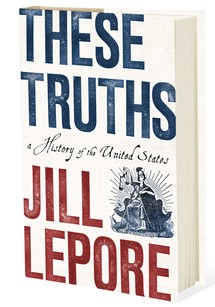These Truths
By Jill Lepore
960 pages;
W. W. Norton & Company
Writing about American figures from Wonder Woman to Ben Franklin's little-known sister, Jane, Jill Lepore has built a rich body of work exploring our nation's past from unexpected angles. But with These Truths (Norton), she tackles the whole story—the unfolding of the American experiment and its consequences—from 1492 to the present. We spoke with the Harvard professor and New Yorker writer about reckoning with our origins and why, in Abraham Lincoln's words, "we must disenthrall ourselves, and then we shall save our country."
O: Why did you choose this moment to write a nearly 800-page work on our country's evolution?
Jill Lepore: When I was just starting out as a historian, I was influenced by a generation of scholars who, in the 1930s, tried to explain democracy and America's relationship to it in order to counter the rise of fascism. They felt this was their civic duty. Today authoritarianism is again ascendant—and I sleep better knowing I have tried to do my part to illuminate what's at stake.
O: Does being a woman in a male-dominated field inform your work?
JL: Not too long ago, I visited a kindergarten class that was studying the American Revolution. Each student had to pick a historical figure to write about. I asked if anyone had chosen a woman. A little girl yelled: "No! There were no women then!" Even in 2018, that's what lots of kids think. There are still textbooks in which Harriet Tubman and Gloria Steinem are the only females who play a major role—and they're lucky to get three pages apiece! My book incorporates the words and deeds of women and people of color from the first.
O: You worry that some use the founding principles as "articles of faith, never to be questioned."
JL: I try to inhabit the neutral territory between reverence and worship on one side, and irreverence and contempt on the other. I prefer to let the dead speak for themselves, and not play critic or moralist.
O: If you could pick one piece of the past that Americans don't know enough about but should get up to speed on, what would it be?
JL: Jim Crow—a century of legal segregation and pretty much a daily campaign of terror continues to cast a very long shadow.
O: The Constitution's authors hoped to create a political society governed by "reflection and election, by reason and truth, rather than by accident and violence, by prejudice and deceit." How are we doing on that front?
JL: I suppose if we could agree on what our founding ideals were, we wouldn't be so divided. But agreement isn't actually what's called for. Neither is holding ourselves up to imaginary versions of "our founders." The point is, those original principles have got to be scrutinized and debated. That's why studying the past is essential. Me, I'd like to see less posturing and more pondering. Less tweeting and more thinking.
— Natalie Beach


